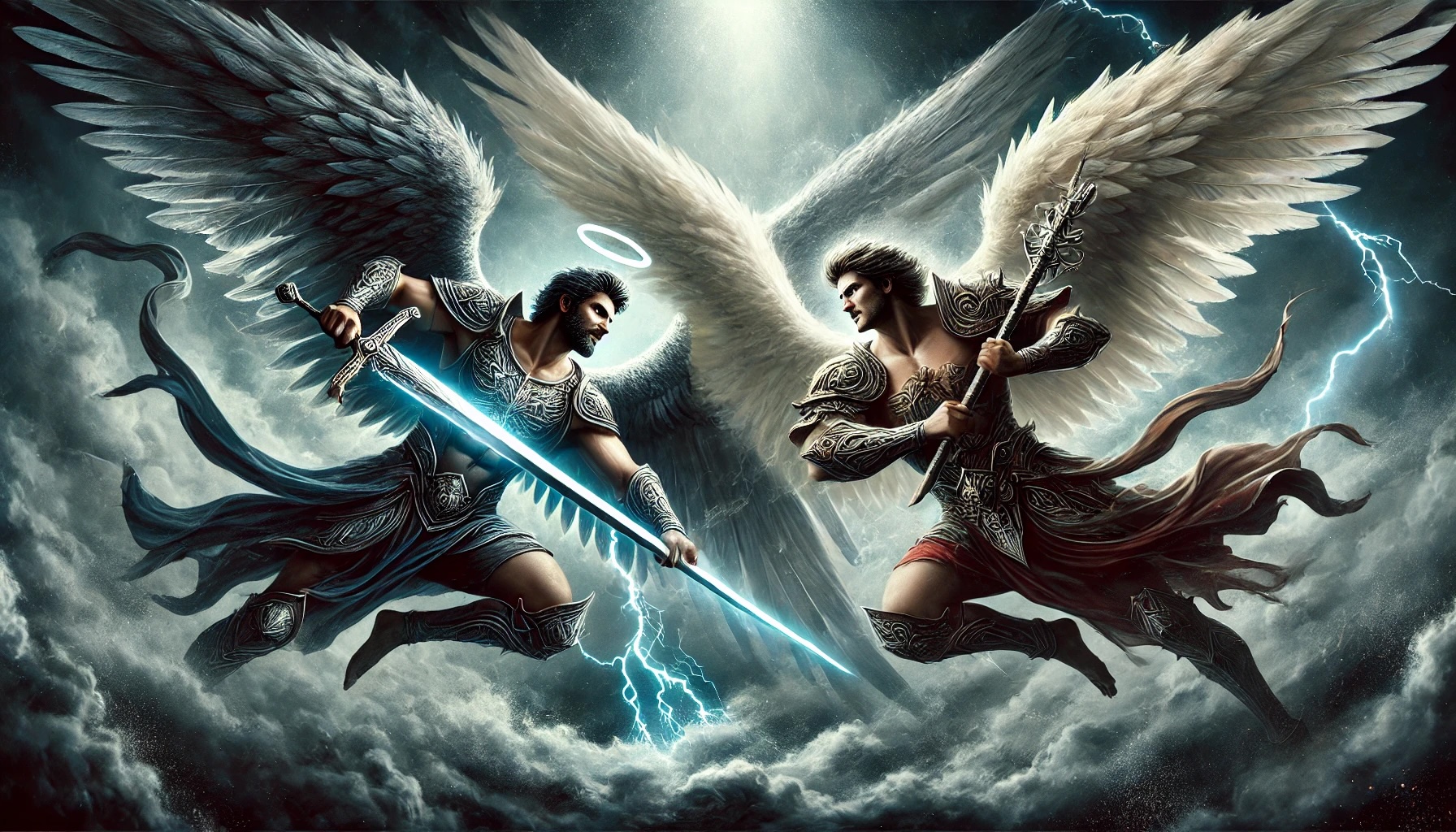
Scene 24: The Village of Strange Faith
Exterior. An Old Village – Day
The village stands in stark contrast to the modern world. Its rustic charm is devoid of any modern technology, with cobblestone streets, wooden carts pulled by oxen, and villagers dressed in simple, traditional clothing. The air is filled with the sounds of laughter and merriment as the villagers prepare for their festival.
Be-el and Azazel enter the village, their eyes scanning the surroundings with curiosity.
BE-EL (looking around, intrigued) This place… it’s like stepping back in time. Everything here is so… familiar.
AZAZEL (nodding) Indeed. It’s as if this village has remained untouched by the passage of time.
Be-el notices villagers pulling carts with cows, children playing in the streets, and the aroma of freshly baked bread wafting through the air. The village is alive with activity as they prepare for their festival. The villagers’ faces are filled with joy and anticipation, their hands busy decorating the streets with colorful banners and garlands of flowers.
VILLAGER 1 (smiling, to another villager) The festival is going to be grand this year. We’ve put in so much effort to make it special.
VILLAGER 2 (grinning) Indeed. Our God will be pleased with our devotion.
As Be-el and Azazel move deeper into the village, they come across a large gathering in the village square. At the center of the square is a makeshift stage where an enactment of a religious ritual is taking place.
BE-EL (speaking to a nearby villager) What is this celebration about?
VILLAGER 3 (proudly) It’s our annual festival to honor our God. We reenact His suffering and sacrifice to show our devotion and gratitude for His protection.
BE-EL (thoughtfully) Interesting…
Azazel and Be-el watch as the villagers act out a detailed and intense reenactment of their God’s suffering. The actors portray scenes of pain and anguish, each moment meticulously crafted to mirror ancient texts. The crowd watches with rapt attention, their faces a mix of solemn reverence and excitement.
A procession forms, led by a man playing the role of their God. He carries a heavy wooden cross, stumbling under its weight. The villagers follow behind, chanting prayers and singing hymns. The atmosphere is charged with a mix of devotion and anticipation.
ACTOR (playing the God) (crying out in pain, in Aramaic) “אבא, לידיך אפקיד רוחי” (Abba, l’yadeykha afqid ruhi)
The villagers cheer as the actor’s performance reaches its climax. The scene is hauntingly realistic, the actor’s screams echoing through the square. The actor, portraying their God, is nailed to a wooden cross, his face contorted in agony. His body is covered in real wounds, blood trickling down his limbs. The crowd watches with rapt attention, their faces a mix of solemn reverence and excitement.
VILLAGER 4 (cheering) Praise be to our God!
VILLAGER 5 (excitedly) His suffering saves us all!
BE-EL (to Azazel, disgusted) These people celebrate suffering. They find joy in this display of pain. It’s madness.
AZAZEL (agreeing) Humans are often drawn to rituals of sacrifice and redemption. It’s their way of connecting with the divine, no matter how twisted it seems.
BE-EL (scoffing) There is no true divine connection here. Just a perverse joy in another’s agony.
The festival continues, with villagers dancing, singing, and feasting. The mood is jubilant, despite the macabre spectacle they just witnessed. Children run around with painted faces, mimicking the actors, while adults share stories and laughter.
VILLAGER 6 (raising a glass) To our God! May He continue to protect us and keep us safe!
VILLAGER 7 (smiling) We are truly blessed. His sacrifice is our salvation.
Be-el observes the scene, a mix of fascination and revulsion in his eyes.
BE-EL (to himself) How can they be so blind? They celebrate a death that brings them no real salvation.
AZAZEL (quietly) Faith can be a powerful thing, Be-el. It can inspire great acts of good… and terrible acts of madness.
The procession reaches its climax as the actor playing their God breathes his last breath. His final words in Aramaic hang heavy in the air, “אבא, לידיך אפקיד רוחי” (Abba, l’yadeykha afqid ruhi). The villagers cheer, their faces alight with a fervor that borders on madness.
BE-EL (to Azazel, incredulously) They leave him there to die, just like that. And then they cheer. It’s insanity.
AZAZEL (shaking his head) Humans and their rituals. They find solace in the strangest of things.
The villagers, having finished their enactment, leave the actor to hang, his body eventually becoming a feast for the crows. The crowd disperses, moving on to the next part of their festival, filled with singing, dancing, and celebration.
BE-EL (to himself) How can they celebrate such a barbaric ritual? It’s as if they’ve lost all sense of humanity.
AZAZEL (smirking) Faith can blind them to the horror of their actions. They see it as a necessary sacrifice, a way to honor their God.
As Be-el and Azazel continue to explore the village, they come across a figure standing on a raised platform. He is dressed in ornate robes, his presence commanding and authoritative. The villagers gather around him, listening intently.
PROPHET (raising his arms) People of the village, behold the glory of our festival! See how our God is pleased with our devotion. Today, we have shown Him that we remember His sacrifice, that we honor His pain.
VILLAGER 8 (cheering) Praise be to our Prophet!
VILLAGER 9 (excitedly) He speaks the truth. Our God is pleased with us!
Be-el and Azazel watch as the Prophet continues his speech, his words weaving a powerful spell over the villagers.
PROPHET (with conviction) Our God watches over us, protects us, because we show Him that we remember. We give Him our devotion, our faith, and in return, He grants us His protection. Remember this always, my people. Our faith is our strength, our bond with the divine.
BE-EL (to Azazel, disgusted) He’s nothing but a false prophet, manipulating these people for his own gain.
AZAZEL (nodding) Yes, but see how they follow him. His words are law here. They worship him almost as much as their God.
PROPHET (finishing his speech) Go now, celebrate, and let our God’s blessing be upon you all!
The villagers cheer once more, their faith and devotion unwavering. The Prophet descends from the platform, his eyes meeting Be-el’s. There is a moment of silent recognition, as if the Prophet can sense the power that Be-el holds.
PROPHET (approaching Be-el) You are not from this village. What brings you here?
BE-EL (coolly) We are travelers, seeking knowledge and understanding.
PROPHET (smiling) Then you have come to the right place. Our village is filled with wisdom and faith. Stay, learn, and perhaps you will find what you seek.
BE-EL (thoughtfully) Perhaps we will.
The Prophet nods and turns back to his people, leaving Be-el and Azazel to ponder the strange faith and customs of this village.
BE-EL (to Azazel) We need to find the next artifact. This place, despite its strange customs, might hold more secrets than it appears.
AZAZEL (agreeing) Yes, we should continue our search. Let’s see what else this village hides.
They move on, their minds focused on the task ahead. The echoes of the villagers’ celebration linger in their ears, a reminder of the strange and twisted faith that drives humanity. The festival’s music and laughter fade into the background as they make their way to the outskirts of the village, determined to uncover the artifact’s location.
FADE OUT.

Leave a Reply